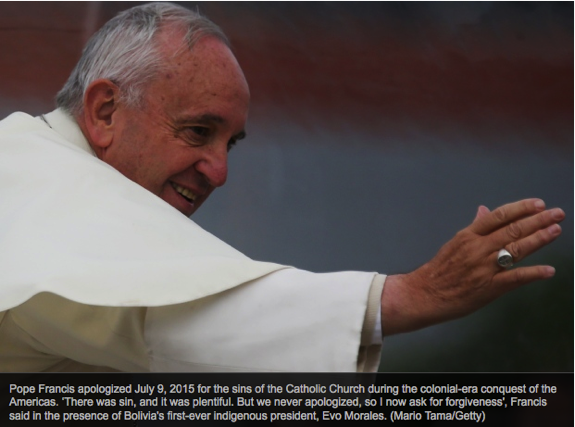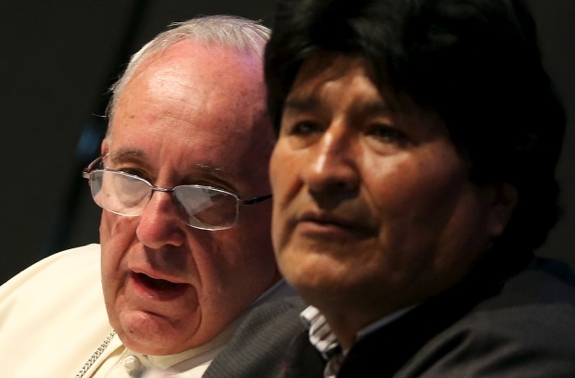
Click on picture to see more pictures in original article.
Pope asks pardon for church's 'crimes' against indigenous
July 10, 2015 - cbc.ca (AP)
Francis acknowledged 'crimes committed against the native peoples during the so-called conquest of America'
Pope Francis apologized Thursday for the sins, offences and crimes committed by the Catholic Church against indigenous peoples during the colonial-era conquest of the Americas, delivering a powerful mea culpa on the part of the church in the climactic highlight of his South American pilgrimage.
History's first Latin American pope "humbly" begged forgiveness during an encounter in Bolivia with indigenous groups and other activists and in the presence of Bolivia's first-ever indigenous president, Evo Morales.
• Can Pope Francis's 'street cred' shift the climate change debate?
• Pope Francis urges 'decisive' climate change action
Francis noted that Latin American church leaders in the past had acknowledged that "grave sins were committed against the native peoples of America in the name of God." St. John Paul II, for his part, apologized to the continent's indigenous for the "pain and suffering" caused during the 500 years of the church's presence in the Americas during a 1992 visit to the Dominican Republic.
But Francis went farther, and said he was doing so with "regret."
"I would also say, and here I wish to be quite clear, as was St. John Paul II: I humbly ask forgiveness, not only for the offences of the church herself, but also for crimes committed against the native peoples during the so-called conquest of America," he said to applause from the crowd.
'There was sin'
Then deviating from his prepared script, he added: "I also want for us to remember the thousands and thousands of priests who strongly opposed the logic of the sword with the power of the cross. There was sin, and it was plentiful. But we never apologized, so I now ask for forgiveness. But where there was sin, and there was plenty of sin, there was also an abundant grace increased by the men who defended indigenous peoples."
(below) 2 Pope Francis made his apology in the presence of Bolivia's first indigenous president, Evo Morales. (Alessandro Bianchi/Reuters)

Francis' apology was met with wild applause from the indigenous and other grass-roots groups gathered for a world summit of popular movements whose fight against injustice and social inequality has been championed by the pope.
"We accept the apologies. What more can we expect from a man like Pope Francis?" said Adolfo Chavez, a leader of a lowlands indigenous group. "It's time to turn the page and pitch in to start anew. We indigenous were never lesser beings."
The apology was significant given the controversy that has erupted in the United States over Francis' planned canonization of the 18th century Spanish priest Junipero Serra, who set up missions across California. Native Americans contend Serra brutally converted indigenous people to Christianity, wiping out villages in the process, and have opposed his canonization. The Vatican insists Serra defended natives from colonial abuses.
Benedict's controversial statements
Francis' apology was also significant given the controversy that blew up the last time a pope visited the continent. Benedict XVI drew heated criticism when, during a 2007 visit to Brazil, he defended the church's campaign to Christianize indigenous peoples. He said the Indians of Latin America had been "silently longing" to become Christians when Spanish and Portuguese conquerors violently took over their lands.
"In effect, the proclamation of Jesus and of his Gospel did not at any point involve an alienation of the pre-Columbus cultures, nor was it the imposition of a foreign culture," Benedict told the continent's bishops.
Amid an outcry from indigenous groups, Benedict subsequently acknowledged that "shadows accompanied the work of evangelizing" the continent and said European colonizers inflicted "sufferings and injustices" on indigenous populations. He didn't apologize, however.
The Vatican spokesman, the Rev. Federico Lombardi, said that Francis wrote the speech on his own and that the apology for the sins, offenses and crimes of the church was a "particularly important declaration."
Church officials have long insisted Catholic missionaries protected indigenous peoples from the abuses of military colonizers and were often punished by European colonial powers as a result. Francis' own Jesuit order developed missions across the continent, educating the indigenous and turning their communities into organized Christian-Indian societies. The Jesuits were expelled in the 17th century.
'The church stole our land'
Campesino leader Amandina Quispe, of Anta, Peru, who attended the grass-roots summit, said the church still holds lands it should give back to Andean natives. The former seat of the Inca empire, conquered by Spaniards in the 16th century, is an example.
"The church stole our land and tore down our temples in Cuzco and then it built its own churches — and now it charges admission to visit them," she said.
Francis' apology was not the first. After his 1992 apology, John Paul II issued a sweeping but vague apology for the Catholic Church's sins of the past during the church's 2000 Jubilee. A year later, he apologized specifically for missionary abuses against aborigines in Oceania. He did so in the first ever papal email.